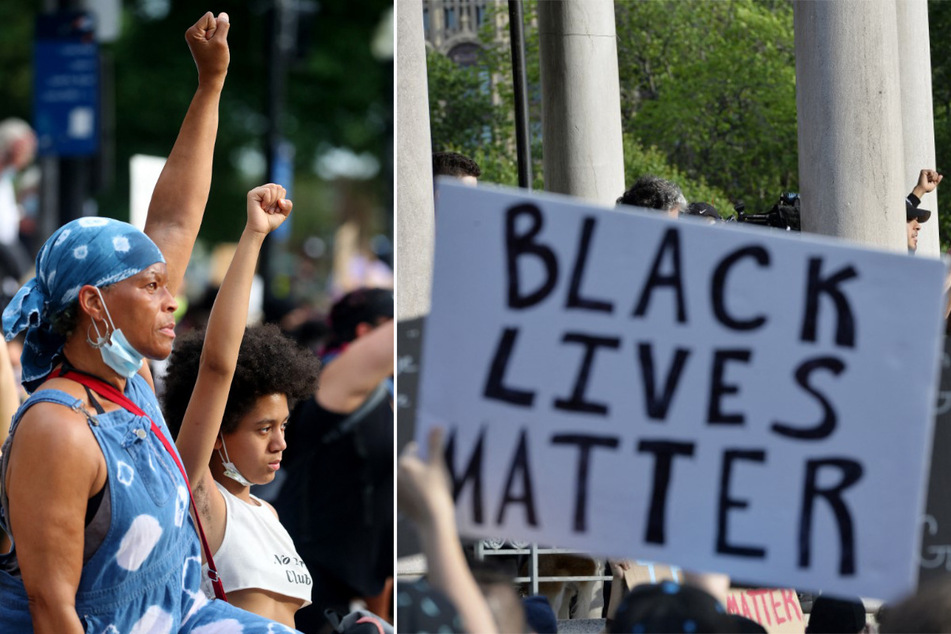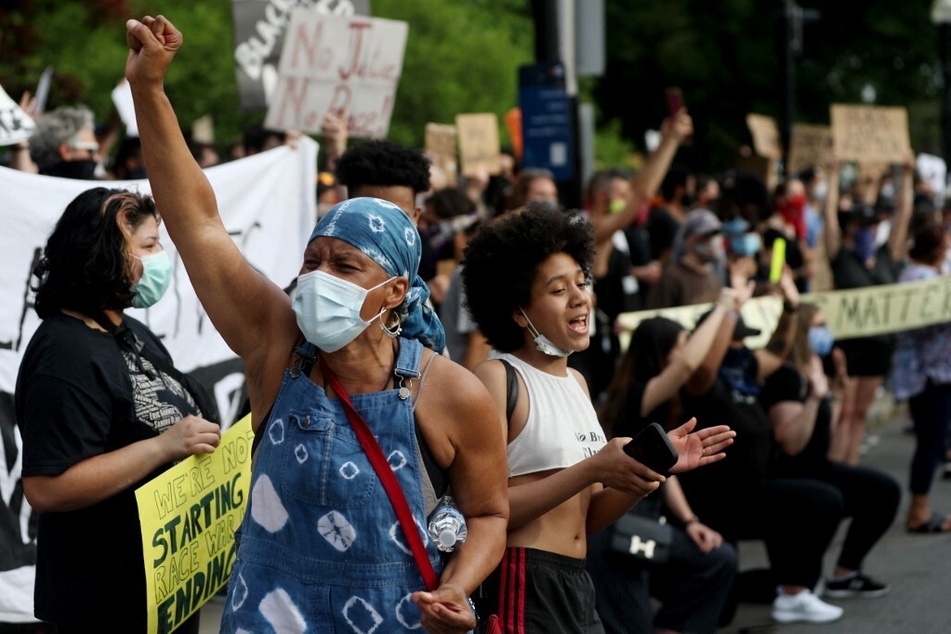Boston harms report reveals stark racial disparities and sets the tone for reparations
Boston, Massachusetts - A new report detailing Boston's staggering racial inequities and their historic roots is providing increased momentum behind the push for comprehensive reparations.

In its 145-page Harm Report: Connecting the Past to the Present State of Black Boston, the nonprofit Embrace Boston makes the case for repair for damages inflicted during the eras of chattel slavery, Jim Crow apartheid, and present-day racial discrimination.
Massachusetts became the first colony to legalize slavery in 1641, and by the late 17th century, around half of the ships in the Boston harbor were involved in the West Indian slave trade, the report notes.
New Englanders provided the investment capital and farmed crops, livestock, and fish for West Indian plantations. They got rich off the profits of forced labor as Puritan ministers weaponized Christianity to justify the continued enslavement of Black people.
Although Massachusetts became the first state to outlaw slavery in 1783, discriminatory laws and policies have continued to the present day, driving stark racial inequities in the City on a Hill.
After the 2020 police murder of George Floyd and the explosion of the Black Lives Matter movement, Boston began taking steps to address its legacy of white supremacy. The city council green lit the establishment of a reparations task force in a 2022 ordinance and recently named two research teams to assist those efforts.
The new Embrace Boston report sets the tone for the task force's work by outlining seven primary injury areas requiring targeted repair: culture and symbols, housing, transportation, education, criminal legal systems, health, and income and wealth.
Culture and symbols
From streets to parks, monuments, buildings, and cultural institutions, Boston's cityscape tells a story of power – who has it and who does not, whose stories matter and whose do not, the report states.
Of the city's nearly 80 statues and monuments, only eight are dedicated to Black history and Black figures. Meanwhile, museums often fail to treat Black art and artists with the same dignity and significance they do white European art.
In fact, funding for the arts in Boston shows remarkable racial disparities, with Helicon Collaborative finding in 2016 that of the $411,063,254 granted to arts and culture organizations in Boston, only $10,960,579 – just 3% – was awarded to organizations focused on racial and ethnic minorities.
Housing
Homeownership is recognized as one of the primary means of building intergenerational wealth. Ongoing housing discrimination has deprived generations of Black Bostonians this opportunity, driving up the city's racial wealth gap.
Racist redlining practices, seizures of homes by eminent domain, and zoning laws have historically deprived Black communities.
Today, only 33.5% of Black households are homeowners as compared to 68.8% of white households, with the city's Black population on the decline as the cost of living rises.
Boston is recognized as one of America's most gentrified cities, taking third place in a National Community Reinvestment Coalition ranking for the years 2013-2017.
Transportation
As in other cities, many Black Bostonians saw their homes taken without compensation via eminent domain to build the highway system.
Today, many Black Bostonians do not have access to that highway system and instead rely on public transportation – with Black neighborhoods underserved by rail infrastructure and more reliant on slower, less direct bus routes.
The lack of adequate public transportation options limits Black Bostonians' access to jobs, grocery stores, and health care facilities. Their neighborhoods also suffer over-pollution and are more vulnerable in weather-related emergencies.
The Embrace Boston report found that the most vulnerable areas of the city largely coincide with the original boundaries drawn by housing redlining.
Education
In 2019, just 25% of the city’s Black third through eighth graders were reading at grade level as compared to 62% of white students, and only 21% of Black students met or exceeded expectations on the Math MCAS as compared to 62% of white students.
These performance gaps result in far lower high-school graduation rates at 79.9% for Black students and 92.6% for white students. This translates to worse employment opportunities.
Black students also face disciplinary actions and out-of-school suspensions at higher rates, feeding the school-to-prison pipeline.
While 40% of Boston public school students are children and adolescents of color, just 8% of teachers are non-white, a 2018 Massachusetts Education Equity Partnership analysis found.
Criminal legal systems
In the 19th century, Boston became the first US city to establish an official police force, an institution which traces its roots to the infamous slave patrols that predated upon Black people across the South.
Today, the Boston Police Department reflects that racist legacy, with white officers making up 65% of the force in 2021 despite white residents only accounting for 45% of the city's population.
Although Black Bostonians only make up around 25% of the population, they were targeted in 58% of arrests in 2020, with police brutality remaining a systemic issue.
The War on Drugs contributed significantly to the mass incarceration plaguing Black communities. The decriminalization of cannabis in 2016 has not brought about the transformational changes required to address historic harms.
The Massachusetts Cannabis Control Commission found in 2021 that around 72% of the more than 18,000 people with cannabis licenses were white, while just 6% were Black.
Health
Worse social conditions, driven by generations of racist laws and policies, have detrimental effects on Black health. Living in redlined areas negatively impacts severe asthma rates, birth outcomes, cancer rates, and food quality and access.
The Black maternal mortality and morbidity crisis is exacerbated by the disparate incarceration of pregnant Black women. Mass incarceration also drives higher rates of mental health disorders, diabetes, asthma, hypertension, HIV, and Hepatitis C in Black communities.
The Covid-19 pandemic put these inequities on full display, with Black people in Boston making up approximately one in three pandemic-related deaths as of April 2022.
Income and wealth
The Federal Reserve Bank of Boston reported in 2015 that the median net worth of a white family in Boston was $247,500. For a non-immigrant Black family, it was just $8.
Black Bostonians are more likely not to be homeowners and to have mortgage, student, and medical debt.
The City of Boston has also failed to provide adequate support to Black communities, with The Boston Globe in 2021 finding that just 0.4% of total city contract dollars going toward Black-owned businesses.
Meanwhile, 15.2% of Black workers were forced to file for unemployment during the Covid-19 pandemic, as compared to 7% of white workers, according to an October 2020 analysis.
Repairing the harms

The stark realities highlighted in the harm report elevate demands for comprehensive reparations anchored in an international law and transitional justice framework.
As the city prepares to craft its blueprint for redress, Embrace Boston notes that proposed remedies may extend beyond direct financial restitution for Black Bostonians to include investments in economic development, housing assistance, educational and business grants, scholarship funds, African-centered education, development of historical monuments and museums, community wellness, and more.
"Ultimately, the call for reparations is about more than financial compensation. It is about acknowledging the ongoing harms of systemic racism, addressing the root causes of these injustices, and promoting healing and restoration for individuals and communities who have suffered for far too long," the report states.
Acknowledging the limitations of local efforts, the Embrace Boston report affirms that federal action via HR 40 – legislation to create a national reparations commission – is required to guarantee full repair to Black Americans. President Joe Biden has the authority to establish such a commission by executive order without congressional approval.
But as federal redress remains stalled, municipal initiatives can take a meaningful steps forward in the campaign for justice.
The harms report makes clear that urgent action is required to guarantee a future in which all Bostonians can thrive.
Cover photo: Collage: Maddie Meyer / GETTY IMAGES NORTH AMERICA / Getty Images via AFP & JOSEPH PREZIOSO / AFP

